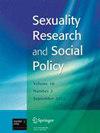“It wasn’t the priority”: Non-binary Children Experiences and Professional Discourse on Public Service Care During the First Wave of COVID-19
IF 2.4
2区 社会学
Q1 SOCIAL SCIENCES, INTERDISCIPLINARY
引用次数: 0
Abstract
Abstract Introduction The lockdown associated with COVID-19 has had a different impact on LGBTI people compared to their heterosexual and cisgender peers, with an even greater impact on children and youth. This study aims to identify the level of satisfaction amongst non-binary children with the attention received from the main social actors during the first wave of the pandemic in Spain, analyse the role of key people, levels of trust, and children’s main concerns and needs. Furthermore, it also aims to understand professional responses to the challenges presented by non-binary children and young people during the first wave of the pandemic. Methods A mixed design has been applied to the collection of quantitative and qualitative data during 2022. A survey of children aged 9 to 17 ( n = 1216, in which there were 32 non-binary children) as well as 30 interviews with professionals in the sector were used during the academic year 2021–2022. Results The results of the study show how non-binary children and young people have significantly less satisfaction than their peers who identified as a boy or a girl with respect to the care received, how gender identity played a fundamental role in their experiences during the lockdown and how professional responses have not had the proper tools to adequately address the challenges that non-binary children and young people posed to services and resources. Conclusions Adversities such as pandemics reproduced and intensified patterns of invisibility, discrimination and social exclusion in most walks of life for children who are outside of the dominant sexual and gender logic. Policy Implications This piece of work allows us to highlight the needs of non-binary children and young people as well as those of psychosocial care professionals in order to support sexual and gender diversity in post-pandemic conditions.“不是优先”:第一波疫情中非二元儿童的经历与公共服务关怀的专业话语
与异性恋和顺性同龄人相比,与COVID-19相关的封锁对LGBTI人群产生了不同的影响,对儿童和青少年的影响更大。这项研究的目的是确定非二元儿童对西班牙第一波大流行期间主要社会行为者给予的关注的满意程度,分析关键人物的作用、信任程度以及儿童的主要关切和需求。此外,它还旨在了解在大流行第一波期间非二元儿童和青年所面临挑战的专业应对措施。方法采用混合设计的方法,对2022年的临床数据进行定量和定性分析。在2021-2022学年期间,对9至17岁的儿童(n = 1216,其中有32名非二元儿童)进行了调查,并对该领域的专业人士进行了30次访谈。研究结果显示,非二元儿童和年轻人在接受照顾方面的满意度明显低于那些被认定为男孩或女孩的同龄人,性别认同如何在他们的封锁经历中发挥了重要作用,以及专业回应如何没有适当的工具来充分解决非二元儿童和年轻人对服务和资源构成的挑战。流行病等逆境再现并加剧了大多数社会阶层对处于主流性和性别逻辑之外的儿童的不可见、歧视和社会排斥模式。这项工作使我们能够突出非二元儿童和青年以及社会心理护理专业人员的需求,以便在大流行后的条件下支持性和性别多样性。
本文章由计算机程序翻译,如有差异,请以英文原文为准。
求助全文
约1分钟内获得全文
求助全文
来源期刊

Sexuality Research and Social Policy
SOCIAL SCIENCES, INTERDISCIPLINARY-
CiteScore
4.70
自引率
7.70%
发文量
100
期刊介绍:
Sexuality Research and Social Policy is an international multidisciplinary forum for the publication of original peer-reviewed state-of-the-art empirical research on sexuality, theoretical and methodological discussions, and the implications of this evidence for policies across the globe regarding sexual health, sexuality education, and sexual rights in diverse communities. The journal also publishes brief research and conference reports; white papers; book, film, and other reviews; together with guest editorials and commentaries. Sexuality Research and Social Policy occasionally publishes special issues on timely topics.
 求助内容:
求助内容: 应助结果提醒方式:
应助结果提醒方式:


